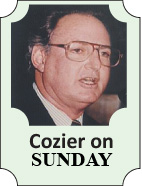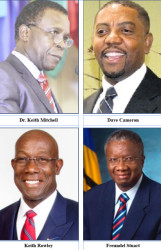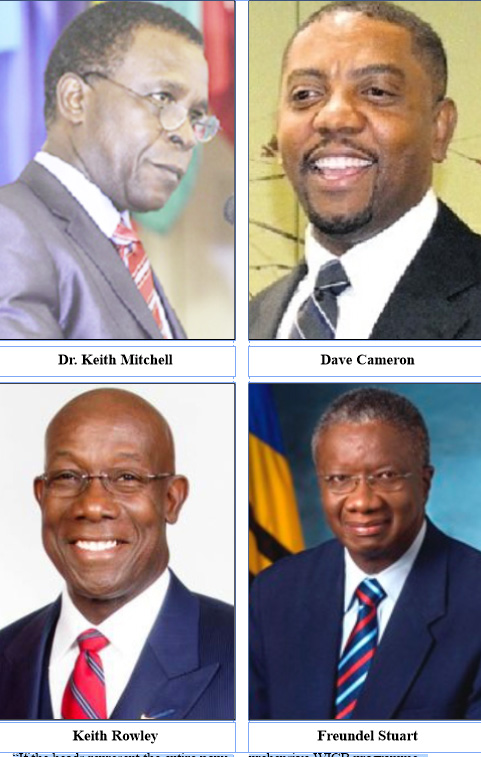THE lawyers advising delegates of the 41 member states of football’s North, Central America and the Caribbean Confederation (Concacaf) on the need for change might just as well have been Caribbean Community (Caricom) governments addressing the directors of the West Indies Cricket Board (WICB) on the same theme.

According to the Reuter news agency’s report, after being cautioned by its lawyers of “the serious consequences if it failed to change its structure,” Concacaf voted on the eve of Friday’s ballot to introduce sweeping reforms.
The WICB has flatly refused to do the same, rejecting the conclusion of three separate, independent committees over the past nine years that reviewed its composition and structure and its governance of the sport.
It finally led to the intervention of Caricom governments and the inevitable confrontation that came to a head at their leaders’ annual conference in Belize last week at which they decided to terminate discussions on the issue with the WICB.

The first of the review committees was appointed in 2007 and headed by former Jamaica prime minister P.J.Patterson, the second in 2012 chaired by St. Kitts-Nevis Queen’s Counsel Charles Wilkin. Both were commissioned by the WICB itself. The third, jointly appointed by Caricom and the WICB and directed by University of the West Indies (UWI) Cave Hill principal Dr. Eudine Barriteau, was presented last November.
Stating that “the status quo is unacceptable,” Patterson complained that he had wasted a year of his life preparing his report. Wilkin immediately resigned from the WICB’s governance committee, charging that the directors “wanted to preserve at all costs their positions on the board.”
Concacaf lawyers listed among its forewarnings “the risk of possible disbandment if change was not enacted.”
That mirrored the Barriteau report’s main point that the WICB “should be immediately dissolved and all current members resign while an interim board is selected…to install a new governance framework.”
WICB president Dave Cameron, in office since 2014, hit back at the thought with indignation.
He insisted that the WICB is a sporting organisation. “International sporting organisations, such as the IOC, FIFA and the ICC, are concerned about governance as it relates to their structures and accountability and their autonomy,” he noted. “It means that the organisation and its leadership must be selected free of interference from governments and its decisions must not be influenced by governments.”
In that regard, that is also FIFA’s unequivocal position.
The WICB viewed the Barriteau committee’s main recommendations as “unnecessary and intrusive, limited in scope and not supported by the facts.”
Frustrated by such intransigence, in spite of the unchecked decline of the regional game, the constant disputes between WICB and leading players and growing public disenchantment, Caricom leaders’ discussed their next move at their Belize meeting.
According to the official communique, they endorsed the submissions of the Barriteau report and “affirmed that they must be implemented.”
Trinidad and Tobago prime minister Keith Rowley said there was “nothing further to be gained by discussing and subjecting the recommendations of the report to further toing and froing.”
Dismissing the WICB’s claim that it is “a body corporate outside of the reach of any interest of heads of government in the region,” Caricom said it intended to inform the International Cricket Council (ICC) and the Board of Control for Cricket in India (BCCI) to “put them on notice” of their position.
“In short, the time has come for serious action in trying to save West Indies cricket,” Rowley declared.
Grenada prime minister Keith Mitchell, chairman of the Caricom sub-committee on cricket, was adamant that the leaders were not “joking around.”
They would “explore all available options in seeking the desired outcome of improved governance of West Indies cricket.
“If the heads represent the entire population of the region, I don’t know how any organisation that represents just a few persons can, in fact, negate the position of the heads,” he asserted.
Barbados’ prime minister Freundel Stuart was less confrontational. Caricom was not attempting to take over West Indies cricket, he said, even hinting that some, rather than all, his colleagues agreed it was “a waste of time trying to engage” the WICB. Yet, he stressed, the WICB’s “standards of corporate governance” had undermined the integrity and compromised the standards of our game “to which we in the Caribbean have grown accustomed.”
Throughout the impasse, the prominent protagonists have been Mitchell and Cameron. Their disagreement finally extended to the background to the under-19s World Cup success.
Cameron claimed that the preparation of the champion team was part of a comprehensive WICB programme.
Mitchell countered that the performance was the “outcome of serious work being done at the country level with the young players throughout the region where the governments of individual countries have invested millions of dollars in facilities and these young people emerged.”
It did not deter the WICB president from calling on businesses and governments to “consolidate their efforts and invest in the rebuilding of the overall cricket programme,” specifically for government support in building academies within its Professional Cricket League (PCL) franchises.
Given Caricom’s Belize decision and the strong words of Rowley and Mitchell a few days earlier, it was not clear whether he was unaware of the irony of his plea or simply speaking with tongue firmly in cheek.






